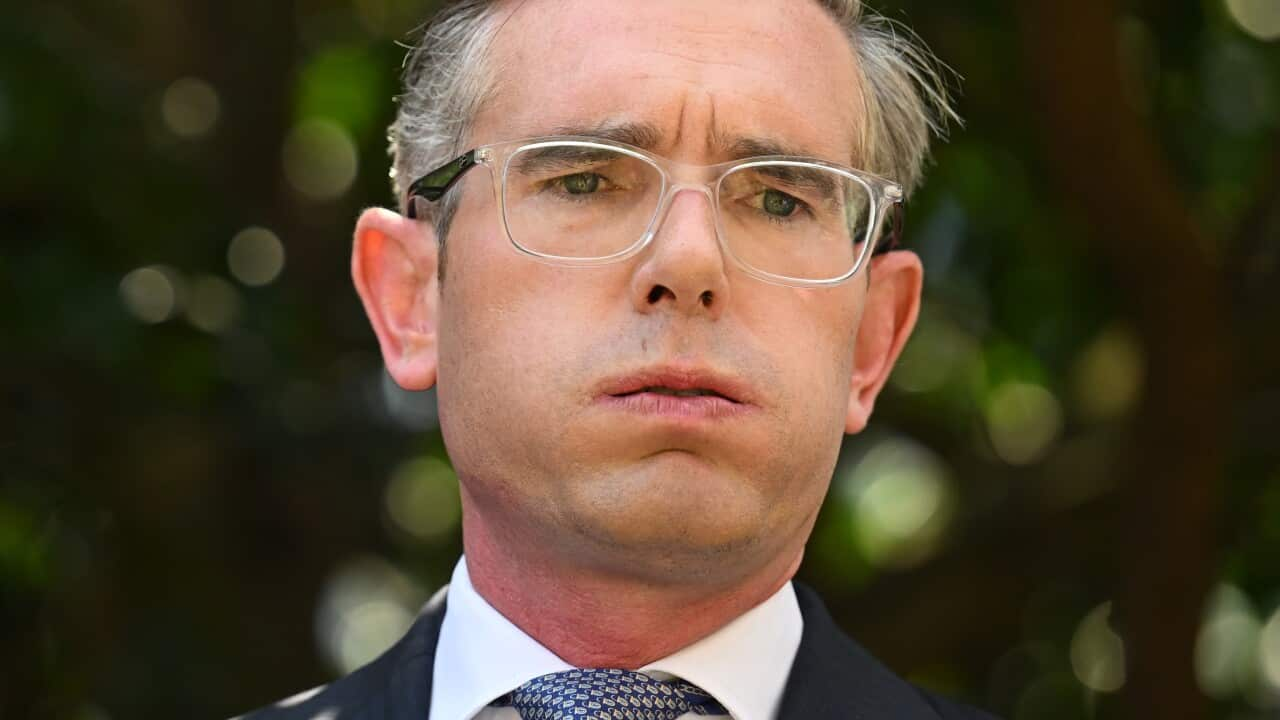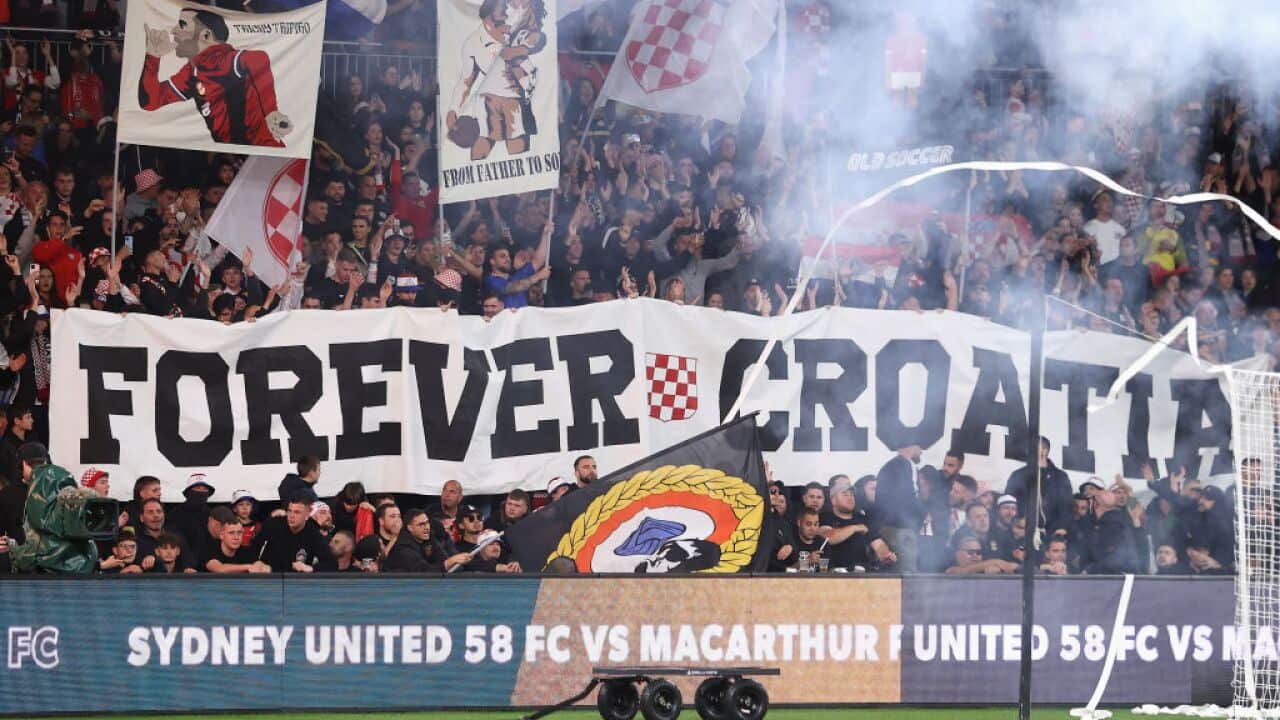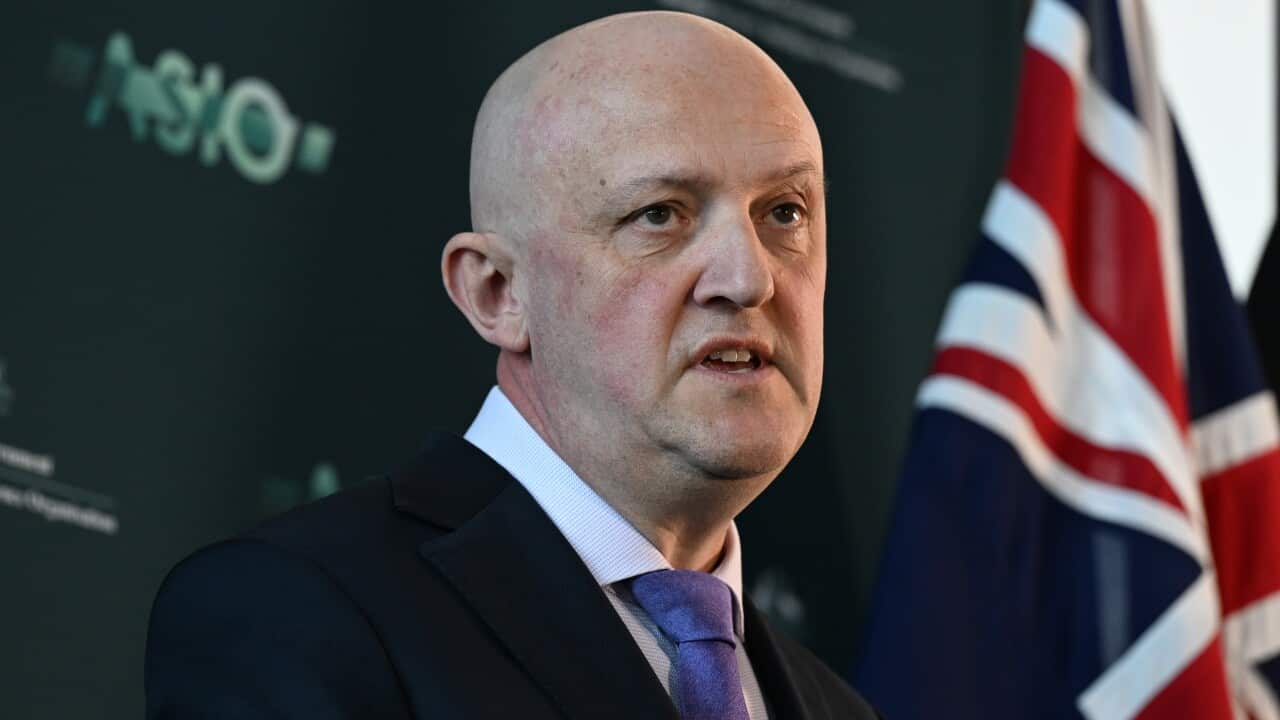

4 min read
This article is more than 2 years old
Exclusive
This Australian state could ban the Nazi salute. Experts say it won't be easy
Victoria Police says it's investigating an incident in which a man made a Nazi salute in front of the media as the state government considers adding to its list of prohibited Nazi symbols.
Published 17 January 2023 5:48am
Updated 17 January 2023 1:27pm
By Tom Canetti
Source: SBS News
Image: A man holds up an anti-fascism sign at a 2019 protest in St Kilda, Victoria. (AAP / David Crosling)
Key Points
- Australian neo-Nazi Thomas Sewell made a salute outside Melbourne's Magistrates Court.
- The Victorian government says it may consider expanding its list of banned Nazi symbols.
- Experts warn violent far-right extremism is on the rise in Australia.
The Victorian government is considering expanding the list of banned Nazi hate symbols in the state after a prominent neo-Nazi made an offensive gesture outside court.
Thomas Sewell made a Nazi salute after speaking to the media last week outside the Melbourne Magistrates Court, where he avoided time behind bars over a brutal attack on a Nine Network security guard.
The 29-year-old leader of the European Australia Movement was convicted and sentenced to an 18-month community corrections order with 150 hours community service. Magistrate Stephen Ballek described the attack as "brutal in its force, speed and repetition".
Outside court, Sewell spoke to the media about the sentence, before making the gesture and praising Adolf Hitler, then walking off.
A spokesperson for Victoria Police said police were investigating.
"Victoria Police is aware of an incident where a 29-year-old man made an anti-Semitic gesture as he exited Melbourne Magistrates Court on Thursday, 12 January. Investigations remain ongoing," the spokeswoman told SBS News in a statement on Tuesday.

Thomas Sewell leaves the Melbourne Magistrates Court in Melbourne on Thursday. Source: AAP / AAP IMAGE/AAPIMAGE
It's been illegal to publicly display Nazi symbols in Victoria since 29 December, when laws prohibiting the display of the Hakenkreuz, often referred to as the Nazi swastika, came into effect. People found flouting the law face a fine of approximately $22,000 or 12 months’ imprisonment.
But the Victorian government could go further.
"We’ve been clear there’s no place for this hateful ideology in Victoria – public demonstrations and displays do nothing but cause further pain and division," a Victorian Government spokesperson told SBS News.
"The government will continue to monitor the use of hate symbols and may consider the inclusion of additional symbols to the legislation at a later stage."
The Nazi salute is banned or restricted in Germany, Austria, Slovakia, the Czech Republic, Switzerland and Sweden.
Hitler salute "a symbol of hatred"
Dr Dvir Abramovich, chairman of the Anti-Defamation Commission, which chronicles incidents of anti-Semitism, said the salute was "another form of the emblem of hatred" and should be banned.
"They use the Hitler salute as a rallying cry to celebrate the murderous legacy of Hitler. I don't think that they should have the law on their side," he told SBS News.
"To see the Hitler salute, it's as threatening as being confronted with a gun.
"It is a weapon in my view. It is an unacceptable reality that in 2023, it is still legal."
Can the Victorian government ban the Nazi salute?
While Victoria implemented legislation in 2022 that bans the public display of the Hakenkreuz, the Nazi salute is not banned.
Extremism expert Dr Josh Roose from Deakin University told SBS News that while banning the salute could be effective, alt-right and far-right groups now use other symbols like the "okay symbol" for "plausible deniability".
The okay symbol is made with the connection of the thumb and index finger, which can be interpreted to reflect a W and P, standing for white power.
Dr Roose said subjects can "just say they are making an okay symbol" if questioned.
"The challenge with making the Hitler salute illegal, as much as potentially desirable, is that same level of ambiguity," Dr Roose said.
"An individual could say they were putting their hand up in the air, and you've misinterpreted the burden of proof, which is actually quite difficult.
"From a legal perspective, you'd have to look to contexts, and put a lot of time and effort and resources into prosecuting."
Dr Roose said that banning certain groups might also make them more difficult to track.
"Would they then go underground?" he said.
"They could reform under different names, dissipate, spread, or pop up in new places."
The Director-General of the Australian Security Intelligence Organisation, Mike Burgess, warned Australians of the growing threat of far-right extremism in his 2021 Annual Threat Assessment.
"Ideological extremism investigations have grown from around one-third of our priority counter-terrorism caseload, to around 40 per cent," he said.
"People often think we’re talking about skinheads with swastika tattoos and jackboots roaming the backstreets like extras from [movie] Romper Stomper, but it’s no longer that obvious."




